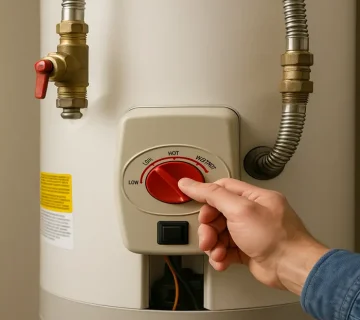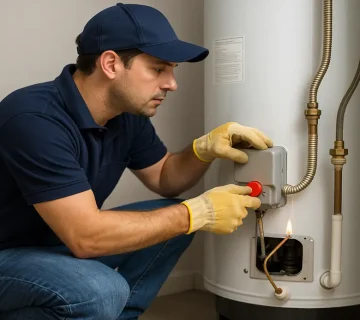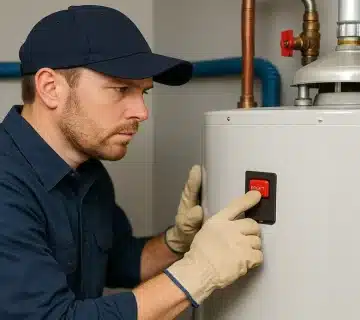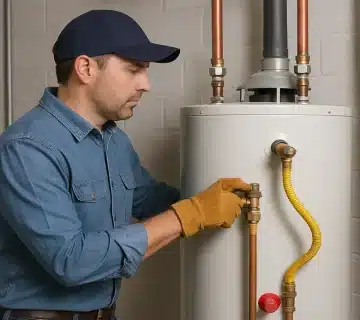Replace your water heater to avoid unexpected cold showers, water damage, and costly repairs. Your water heater is one of the most essential appliances in your home, providing hot water for showers, cooking, and cleaning. However, like any appliance, it has a limited lifespan. Knowing when to replace your water heater can save you from inconvenient problems. Here are the five crucial signs that it’s time to replace your water heater.
1. Age of the Water Heater
Most water heaters have a lifespan of 8 to 12 years. If your unit is approaching or has surpassed this age range, it’s time to start considering a replacement. Check the manufacturer’s label or serial number on the tank to confirm its age. Older units are more prone to inefficiency and breakdowns. Replacing your water heater at this stage ensures a reliable and efficient supply of hot water.
An aging water heater may not meet modern energy standards, resulting in higher utility bills. Replacing an old unit with a newer, energy-efficient model can save money in the long run. Additionally, new models often have advanced safety features, making them a worthwhile investment. Beyond that, older units may pose safety hazards due to outdated materials or potential structural weaknesses. If you notice these problems, replace your water heater before it fails completely.
If your water heater is in a location prone to cold temperatures, an older unit may be more susceptible to damage from freezing or corrosion. Insulated models available today are far better at preventing such issues, ensuring better performance and durability. This makes replacing your water heater a smart choice for colder climates.
2. Rusty Water or Corrosion
If you notice rusty or discolored water coming from your hot water taps, it could be a sign of corrosion inside the tank. While replacing the anode rod might fix minor issues, extensive rusting typically means the tank is deteriorating and needs to be replaced to prevent leaks. When corrosion sets in, it’s time to replace your water heater to avoid further complications.
Rusty water can also indicate problems with your home’s plumbing system, so it’s crucial to determine the root cause. Ignoring this issue could lead to severe health and safety concerns, as corroded tanks are more likely to develop leaks or fail entirely. Regular maintenance and water quality testing can help prevent these problems. Using water filtration systems can also reduce the chances of sediment build-up and corrosion over time, prolonging the need to replace your water heater.
3. Strange Noises from the Tank
Over time, sediment builds up at the bottom of the tank. This sediment can harden and cause rumbling or banging noises during operation. Not only do these sounds indicate reduced efficiency, but they also signal wear and tear on the tank. Persistent noises usually mean it’s time to replace your water heater.
Hardened sediment reduces the water heater’s efficiency by creating a barrier between the heating element and the water. This forces the unit to work harder to heat the water, leading to higher energy consumption and increased wear on the system. Flushing your water heater annually can help remove sediment, but if noises persist, replacement may be necessary. Additionally, ignoring these sounds might lead to irreversible damage, such as cracks in the tank. To avoid complete failure, replace your water heater as soon as these issues arise.
4. Water Leaks Around the Tank
Water pooling around the base of your water heater is a clear sign of trouble. Leaks often indicate that the tank has cracked or deteriorated beyond repair. Ignoring a leak could lead to significant water damage, so replacing your water heater promptly is essential.
Small leaks can sometimes be repaired, but they often signal larger issues within the tank. Over time, even minor cracks can expand, causing more significant leaks and potential flooding. Investing in a new water heater can help avoid costly water damage and ensure a reliable supply of hot water. If your water heater is located near finished spaces, such as a basement or utility room, a leak could cause extensive property damage, adding to the urgency to replace your water heater.
5. Inconsistent or Insufficient Hot Water
If your water heater struggles to provide consistent or adequate hot water, it may be due to a failing heating element or an overtaxed unit. While some issues can be repaired, repeated problems often signal that replacement is the better long-term solution. Replacing your water heater in these situations ensures consistent hot water for your household.
Inconsistent hot water can be frustrating and disrupt your daily routine. It may also indicate that your water heater is too small to meet your household’s needs. Upgrading to a larger or more efficient model can help resolve these issues and provide a more comfortable living environment. Additionally, if your family size has grown, your water heater may no longer be suitable, making it necessary to upgrade to a unit that can handle increased demand. To meet these needs effectively, replace your water heater with a model suited for your family’s requirements.
Additional Considerations for Replacement
When replacing your water heater, it’s essential to consider factors such as size, energy efficiency, and type. Here are a few options to keep in mind:
- Tank vs. Tankless Water Heaters:
- Tank water heaters store a specific amount of hot water and are suitable for households with consistent water usage.
- Tankless water heaters provide on-demand hot water, making them more energy-efficient and ideal for homes with varying water needs.
- Energy Efficiency:
- Look for water heaters with high Energy Factor (EF) ratings or ENERGY STAR certifications. These models use less energy, helping you save on utility bills.
- Fuel Type:
- Choose between gas, electric, or solar-powered water heaters based on your home’s infrastructure and energy preferences.
- Smart Technology:
- Many modern water heaters come with smart features, allowing you to monitor and control your unit’s settings remotely through a smartphone app.
Replacing your water heater with one of these advanced models can enhance your home’s efficiency and convenience.
Maintaining Your New Water Heater
Once you’ve replaced your water heater, proper maintenance is key to ensuring its longevity and efficiency. Here are some tips:
- Flush the Tank Annually:
- Remove sediment buildup to maintain efficiency and prevent damage.
- Inspect the Anode Rod:
- Replace the anode rod every 3-5 years to prevent rust and extend the life of the tank.
- Check the Pressure Relief Valve:
- Ensure this safety feature is functioning correctly to avoid pressure buildup.
- Monitor Water Quality:
- Install a water softener if your home has hard water to reduce sediment accumulation.
- Schedule Professional Inspections:
- Regular professional maintenance checks can help identify issues early and extend the lifespan of your water heater.
Final Thoughts
Don’t wait for your water heater to fail completely. Recognizing these signs early can save you time, money, and hassle. If you’ve noticed any of these issues with your water heater, consult a professional to assess whether repair or replacement is the best course of action. Replacing your water heater at the right time ensures safety and reliability for your household.
By staying proactive and choosing the right replacement, you can ensure a steady supply of hot water and peace of mind for years to come. A reliable water heater not only enhances your daily comfort but also adds value to your home, making it a smart investment for the future. Plus, by selecting energy-efficient options, you’ll also contribute to a more sustainable environment—a win-win for you and the planet.
Connect with Us
For more information or to schedule a water heater replacement, visit Value Water Heaters. Follow us on Facebook for updates and tips, or check out our YouTube channel for helpful videos and guides.





